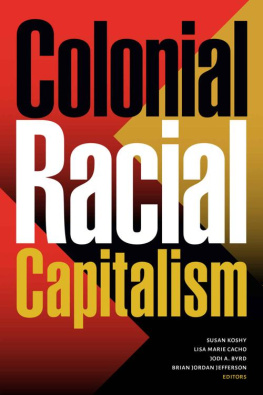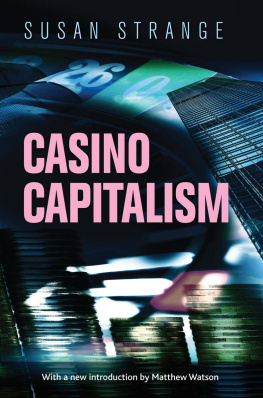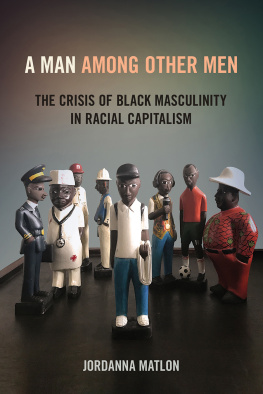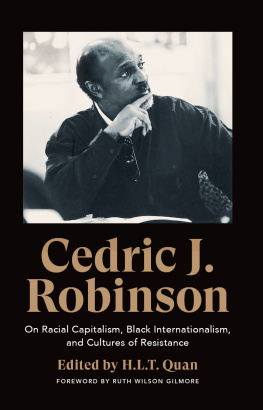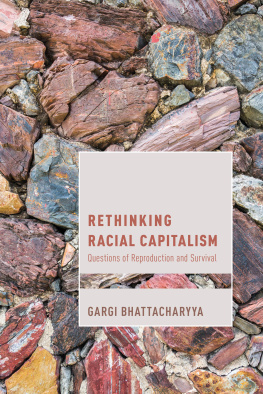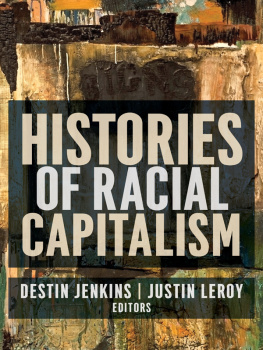etal. susan koshy - Colonial Racial Capitalism
Here you can read online etal. susan koshy - Colonial Racial Capitalism full text of the book (entire story) in english for free. Download pdf and epub, get meaning, cover and reviews about this ebook. year: 2022, publisher: Duke University Press, genre: Politics. Description of the work, (preface) as well as reviews are available. Best literature library LitArk.com created for fans of good reading and offers a wide selection of genres:
Romance novel
Science fiction
Adventure
Detective
Science
History
Home and family
Prose
Art
Politics
Computer
Non-fiction
Religion
Business
Children
Humor
Choose a favorite category and find really read worthwhile books. Enjoy immersion in the world of imagination, feel the emotions of the characters or learn something new for yourself, make an fascinating discovery.
- Book:Colonial Racial Capitalism
- Author:
- Publisher:Duke University Press
- Genre:
- Year:2022
- Rating:5 / 5
- Favourites:Add to favourites
- Your mark:
- 100
- 1
- 2
- 3
- 4
- 5
Colonial Racial Capitalism: summary, description and annotation
We offer to read an annotation, description, summary or preface (depends on what the author of the book "Colonial Racial Capitalism" wrote himself). If you haven't found the necessary information about the book — write in the comments, we will try to find it.
Colonial Racial Capitalism — read online for free the complete book (whole text) full work
Below is the text of the book, divided by pages. System saving the place of the last page read, allows you to conveniently read the book "Colonial Racial Capitalism" online for free, without having to search again every time where you left off. Put a bookmark, and you can go to the page where you finished reading at any time.
Font size:
Interval:
Bookmark:
Colonial Racial Capitalism
SUSAN KOSHY, LISA MARIE CACHO, JODI A. BYRD, ANDBRIAN JORDAN JEFFERSON, EDITORS
DUKE UNIVERSITY PRESSDurham and London 2022
2022 DUKE UNIVERSITY PRESS
Racial Capitalism Now 2022 Michael C. Dawson and Ruth Wilson Gilmore
All rights reserved
Printed in the United States of America on acid-free paper
Project editor: Lisa Lawley
Designed by Matthew Tauch
Typeset in Arno Pro and Alegreya Sans by Westchester Publishing Services
Library of Congress Cataloging-in-Publication Data
Names: Koshy, Susan, editor. | Cacho, Lisa Marie, editor. | Byrd, Jodi A., editor. | Jefferson, Brian Jordan, [date] editor.
Title: Colonial racial capitalism / Susan Koshy, Lisa Marie Cacho, Jodi A. Byrd, and Brian Jefferson, editors.
Description: Durham : Duke University Press, 2022. | Includes bibliographical references and index.
Identifiers: LCCN 2022000016 (print)
LCCN 2022000017 (ebook)
ISBN 9781478016106 (hardcover)
ISBN 9781478018742 (paperback)
ISBN 9781478023371 (ebook)
Subjects: LCSH: Indians, Treatment ofNorth AmericaHistory. | Settler colonialismUnited StatesHistory. | Indians of North AmericaEconomic conditions. | Indians of North AmericaColonizationHistory. | ImperialismSocial aspectsNorth AmericaHistory. | CapitalismNorth AmericaHistory. | RacismNorth AmericaHistory. | Racism Economic aspectsNorth America. | North AmericaRace relationsHistory. | BISAC: SOCIAL SCIENCE / Ethnic Studies / American / African American & Black Studies | SOCIAL SCIENCE / Ethnic Studies / American / Native American Studies
Classification: LCC E91 .C656 2022 (print) | LCC E91 (ebook) | DDC 970.004/97dc23/eng/20220518
LC record available at https://lccn.loc.gov/2022000016
LC ebook record available at https://lccn.loc.gov/2022000017
Support for this research was provided by the Unit for Criticism and Interpretive Theory at the University of Illinois, Urbana-Champaign.
- SUSAN KOSHY, LISA MARIE CACHO, JODI A. BYRD AND BRIAN JORDAN JEFFERSON
- JOANNE BARKER
- ALYOSHA GOLDSTEIN
- CHERYL I. HARRIS
- KIMBERLY KAY HOANG
- LISA MARIE CACHO AND JODI MELAMED
- MARISOL LEBRN
- BRIAN JORDAN JEFFERSON
- IYKO DAY
- LAURA PULIDO
- FACILITATED BY BRIAN JORDAN JEFFERSON AND JODI MELAMED
This one is for Cedric Robinson. For everything he taught me about race, politics, institutions, fighting, and living. I feel blessed to have known Cedric as a friend and mentor for the nine years I was at UCSanta Barbara. His expansive intellect, his transfigurative political commitments, his luminous integrity, and his mischievous humor were a gift, teaching lessons I continue to learn. I hope that the work in this volume as well as the work that it took to produce this volume will carry forward the spirit of his work and testify to its horizon-shifting powers.
Before this book took shape as a publication, it was an event. This project was first conceived as a conference on racial capitalism organized through the Unit for Criticism and Interpretive Theory at the University of Illinois, Urbana-Champaign, in March 2019. I would like to thank my co-organizersJodi Byrd, Lisa Marie Cacho, Brian Jordan Jefferson, and Jodi Melamedfor their creativity and dynamism in planning the conference. For their inspiring contributions to the conference as keynote speakers and for the example of their scholarship and activism, my deepest gratitude to Michael Dawson and Ruth Wilson Gilmore. To the contributors to this volume, many of whom took time away from other long-term projects to work on this collection, no thanks will suffice for your remarkable scholarship and collaborative spirit. I also want to thank the units graduate assistants, Alyssa Bralower, Sarah Richter, and Lettycia Terrones, who worked tirelessly to make the conference a success.
This edited volume grows out of the mind-stretching experience of writing and thinking about colonial racial capitalism with my coeditors, Lisa Marie Cacho, Jodi Byrd, and Brian Jordan Jefferson. I am grateful to Lisa for her keen insights, deft revisions, and writerly instincts. My thanks to Jodi, who maintained a consistent focus on the frames of Indigeneity and settler colonialism. I appreciate Brians work in providing clarity, balance, and precision to our thinking at every stage. To Md. Alamgir Hossain, who worked over the summer editing the manuscript, special thanks for his dedicated work. Finally, for her care and thoughtfulness in preparing this manuscript for publication, thanks to the Unit for Criticisms supremely capable research assistant, Ashli Anda.
For the advice, encouragement, and life-giving conversations that carried me through this work, my thanks to my familyVinod, Tanya, Sunjay, and Vinay.
SUSAN KOSHY
I feel like I will always be learning how to theorize, articulate, and write about colonial racial capitalism, and Id like to acknowledge a few people for their brilliance and their patience in thinking through and talking about these concepts with me over the years. Lisa Lowe, Yen Espiritu, Denise Ferreira da Silva, and George Lipsitz are all exceptional mentors who taught challenging classes and provided generous feedback while I was a graduate student. I was also lucky to learn from the other graduate students at UCSD during that time, especially David Coyoca, Ruby Tapia, Rod Ferguson, Grace Hong, Tony Tiongson, Ofelia Cuevas, and the Marlborough House Marxists: Helen Jun, Albert Lowe, Barry Masuda, Boone Nguyen, and Randall Williams. I am very grateful to my fellow coeditors: Jodi Byrd, Brian Jordan Jefferson, and Susan Koshy. Id like to give Susan a special thanks for taking charge, organizing all of us, doing a lot of the hard writing, and keeping us on track. I also want to acknowledge Jodi Byrd for all her patience and support in helping me to rethink racial capitalism in relation to settler colonial studies and Indigenous studies over the last several years. Id like to acknowledge a few people for helping me think specifically about my coauthored chapter in this volume. Id like to thank Ruth Nicole Brown for helping me to write about hard things, and I want to thank her for the work that she does because everything she does is the answer to that all-important question: So what do we do now? I want to thank Chandan Reddy for his own work, brilliance, and generosity in helping us to theorize administrative power. And last, I extend much appreciation to Jodi Melamed, my coauthor, longtime interlocutor, and much-loved friend. I am so grateful for Jodis genius, clarity, big-picture theorizing, and real-world activism. I love the work we produce together, and I love the collaborative process we take to get our shared thoughts out into the world.
LISA MARIE CACHO
I want to thank all my coeditors, and Lisa especially, for the collaborative work on the introduction. I also want to thank Chandan Reddy, Jodi Melamed, Iyko Day, and Alyosha Goldstein, but everyone is already in the collection, so Im just feeling lucky to have been able to think with everyone for this conversation.
I A. BYRD
I would like to thank all who helped organize and participated in the Racial Capitalism conference in Champaign-Urbana in 2019: Alyosha Goldstein, Cheryl Harris, Marisol LeBrn, Kimberly Kay Hoang, Iyko Day, Laura Pulido, Ruth Wilson Gilmore, Michael Dawson, Jodi Byrd, Jodi Melamed, Lisa Marie Cacho, Susan Koshy, Lee Gaines, Chandan Reddy, Alyssa Bralower, and Sarah Richter. I would also like to extend thanks to all the students, faculty, and members of the community who came and provided lively discussion. This volume would not have been possible without such robust and collective input.
Next pageFont size:
Interval:
Bookmark:
Similar books «Colonial Racial Capitalism»
Look at similar books to Colonial Racial Capitalism. We have selected literature similar in name and meaning in the hope of providing readers with more options to find new, interesting, not yet read works.
Discussion, reviews of the book Colonial Racial Capitalism and just readers' own opinions. Leave your comments, write what you think about the work, its meaning or the main characters. Specify what exactly you liked and what you didn't like, and why you think so.

